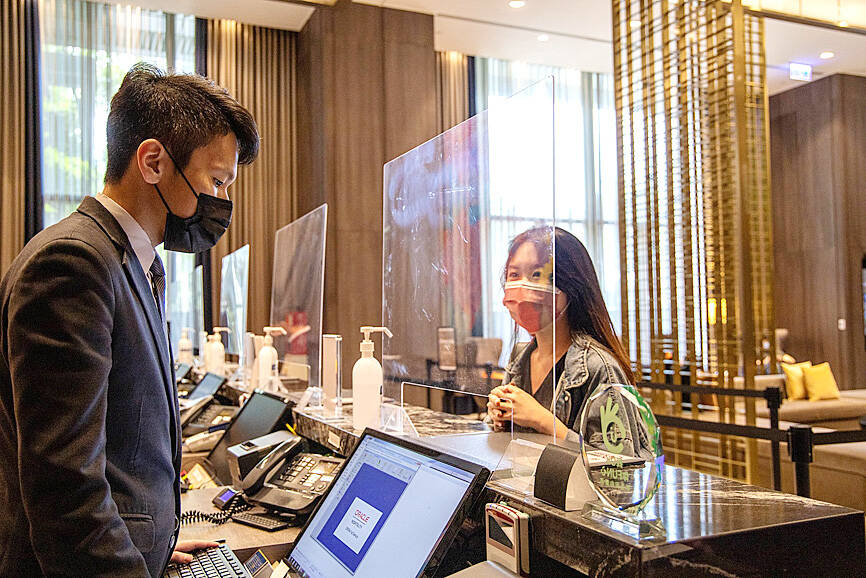Starting from today, international students and overseas Chinese students as well as those from Hong Kong and Macau can work as fulltime housekeeping staff, receptionists and waiters in the hotel and lodging industry, the Ministry of Labor said yesterday.
The new policy is being implemented to address labor shortages in the hotel and lodging industry in the post-COVID-19 pandemic era, particularly as workers are needed for housekeeping, cleaning, booking and reception, as well as hotel dining areas, the Workforce Development Administration said in a statement.
Hoteliers and bed-and-breakfast operators that have certificates issued by the Tourism Administration and local governments can file applications to recruit international students and overseas Chinese students, as well as those from Hong Kong and Macau to fill mid-level jobs, it said.

Photo courtesy of the New Taipei City Government
The number of overseas Chinese students and international students that hoteliers are allowed to hire must not exceed 30 percent of the workforce covered by labor insurance, it added.
The students must have at least an associate’s degree and have undertaken at least 80 hours of internships provided by universities, colleges, the Tourism Administration and other tourism associations to qualify for the program, it said.
The starting salary for qualified students in the program would be NT$30,000 per month, which would be raised to NT$33,000 if their contracts are renewed.
The agency added that it would work with other government agencies to propose amendments to related regulations and establish a work permit system for the students. Such a system would make it possible for more of them to be recruited to replenish the workforce in other sectors such as healthcare, cargo transportation, and the logistics and warehousing industries, as well as the highway and city bus systems, the administration said.
“We will work with the National Development Council, the Ministry of Health and Welfare and the Ministry of Transportation and Communications to jointly evaluate how to use these students more effectively to address the labor shortage problem,” it said.
It said the students can apply for a work permit in accordance with regulations during their studies and use their spare time to work in Taiwan. The maximum number of working hours per week is 20 hours, but there is no limit on the number of working hours during the winter and summer vacations. Meanwhile, employers still need to abide by the working hour regulations of the Labor Standards Act when hiring overseas students.
The Regulations Regarding Study and Counseling Assistance for Overseas Chinese Students in Taiwan (僑生回國就學及輔導辦法), which is enforced by the Ministry of Education, defines “overseas Chinese students” as students of Chinese descent who come to Taiwan to study, who were born and lived overseas until the present time, or who have been living overseas for six or more consecutive years in the immediate past and obtained permanent or long-term residency status overseas.

AIR SUPPORT: The Ministry of National Defense thanked the US for the delivery, adding that it was an indicator of the White House’s commitment to the Taiwan Relations Act Deputy Minister of National Defense Po Horng-huei (柏鴻輝) and Representative to the US Alexander Yui on Friday attended a delivery ceremony for the first of Taiwan’s long-awaited 66 F-16C/D Block 70 jets at a Lockheed Martin Corp factory in Greenville, South Carolina. “We are so proud to be the global home of the F-16 and to support Taiwan’s air defense capabilities,” US Representative William Timmons wrote on X, alongside a photograph of Taiwanese and US officials at the event. The F-16C/D Block 70 jets Taiwan ordered have the same capabilities as aircraft that had been upgraded to F-16Vs. The batch of Lockheed Martin

GRIDLOCK: The National Fire Agency’s Special Search and Rescue team is on standby to travel to the countries to help out with the rescue effort A powerful earthquake rocked Myanmar and neighboring Thailand yesterday, killing at least three people in Bangkok and burying dozens when a high-rise building under construction collapsed. Footage shared on social media from Myanmar’s second-largest city showed widespread destruction, raising fears that many were trapped under the rubble or killed. The magnitude 7.7 earthquake, with an epicenter near Mandalay in Myanmar, struck at midday and was followed by a strong magnitude 6.4 aftershock. The extent of death, injury and destruction — especially in Myanmar, which is embroiled in a civil war and where information is tightly controlled at the best of times —

China's military today said it began joint army, navy and rocket force exercises around Taiwan to "serve as a stern warning and powerful deterrent against Taiwanese independence," calling President William Lai (賴清德) a "parasite." The exercises come after Lai called Beijing a "foreign hostile force" last month. More than 10 Chinese military ships approached close to Taiwan's 24 nautical mile (44.4km) contiguous zone this morning and Taiwan sent its own warships to respond, two senior Taiwanese officials said. Taiwan has not yet detected any live fire by the Chinese military so far, one of the officials said. The drills took place after US Secretary

THUGGISH BEHAVIOR: Encouraging people to report independence supporters is another intimidation tactic that threatens cross-strait peace, the state department said China setting up an online system for reporting “Taiwanese independence” advocates is an “irresponsible and reprehensible” act, a US government spokesperson said on Friday. “China’s call for private individuals to report on alleged ‘persecution or suppression’ by supposed ‘Taiwan independence henchmen and accomplices’ is irresponsible and reprehensible,” an unnamed US Department of State spokesperson told the Central News Agency in an e-mail. The move is part of Beijing’s “intimidation campaign” against Taiwan and its supporters, and is “threatening free speech around the world, destabilizing the Indo-Pacific region, and deliberately eroding the cross-strait status quo,” the spokesperson said. The Chinese Communist Party’s “threats